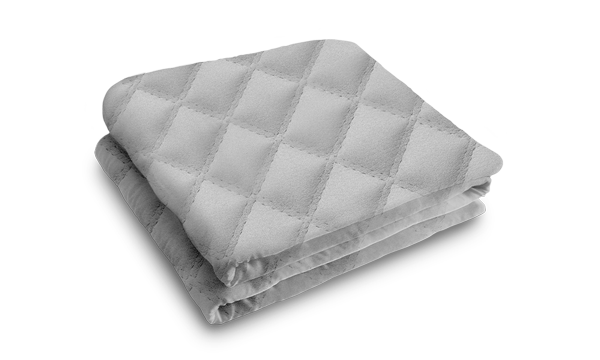We’ve all been there before - it’s past midnight, and something is stopping you from being able to fall asleep. If you’re one of the 70 million adults in the US who struggle with sleep, you don’t have to worry - there are plenty of options out there to try and induce sleep naturally, and we’ve covered them all in this one list.
Here are a couple of solutions that might just be the antidote to your tossing and turning:
1. Get out of bed if you’ve been in there for longer than twenty minutes. While it’s possible to take up to twenty minutes for you to get to sleep, any longer than that might mean your body just isn’t tired enough to get to sleep. Try taking a walk, switching rooms, and doing a little light reading, before returning to your bed to try again.
2. No blue light before bedtime. The light present in your phones and other digital devices can disrupt your circadian rhythm, which can in turn cause interruptions to your sleep cycle. In order to prevent this from happening, try not to use your devices a couple of hours before bedtime.
3. Keep your room cool. Most sleep experts recommend keeping the thermostat in your room set between 60 to 67 degrees Fahrenheit for optimal sleep. If you’re trying to fall asleep, your body temperature has a tendency to decrease, so keeping the room cooler can encourage your body to quicken this process.
4. Practice mindfulness before going to sleep. When you can’t sleep at night because of stress or anxiety, practicing some mindfulness before going to bed is going to help calm your mind down. Mindfulness encourages you to slow your mind down and stay in touch with what your body needs to heal and prepare for the day to come.
5. Engage in something tedious before resting. Doing something tedious and engaging in prolonged, mundane activity can actually help encourage your body to feel tired. This can be any chore around the house - washing dishes or folding up laundry can help with this.
6. Take a warm shower right before bedtime. Having a warm bath right before bedtime can bring down your internal body temperature, speeding up the process of falling asleep.
7. Have a hot cup of herbal tea. While caffeine before bedtime is a big no-no, herbal teas have actually been proven to improve sleep and contribute to deeper rest. Chamomile, lavender, and lemon-verbena teas have also been shown to have a calming effect on the body, to keep things restful.

8. Read that book you’ve been meaning to get to. Wondering how you’re going to entertain yourself without a phone to scroll through or a laptop to binge-watch something on? Try switching out your usual source of entertainment with something like a book, that doesn’t have disruptive light and can actually help you fall asleep quicker.
9. Try not to have too much of that late-night snack. Heavy meals and late-night snacks can actually negatively contribute to the way your sleep cycle develops.
Check out Puffy mattress reviews from real customers and see how we compare with other brands.
10. Practice a nighttime ritual to associate with sleep. Whether it’s an elaborate skincare routine or just the act of lighting a candle and reading a book, engaging in some kind of nighttime ritual is going to help your body associate a certain set of activities with sleep, making it easier in the long run.
11. Trial some aromatherapy to rest better. Aromatherapy is meant to have a naturally calming impact on the brain, thereby triggering deeper sleep. Using lavender or bergamot scented oils have been shown to have a positive impact on the brain.
12. Begin an exercise routine (in the daytime!). Working out during the day will help regulate energy levels, and leave the nighttime for some much-needed recovery for your body. Figuring out what’s sustainable for you will allow you to regulate both your wellbeing and your sleep cycle.
13. Try journaling to detox from sleep anxiety. Keeping a gratitude journal and committing yourself to some daily journaling can help get any stress or fear you have stuck in your head onto a piece of paper, leaving you feeling a lot more at ease as you prepare for a good night’s sleep.
14. Get a new mattress. An old mattress can cause body aches, back pain, and a host of other problems that can potentially disrupt your sleep. Finding the best mattress for your sleep is going to make a significant difference in the quality of your rest.
15. Try getting a sleeping buddy. Studies show sleeping with a partner or pet can actually improve your sleep routine, providing you with feelings of comfort and security throughout the night.
16. Use a playlist for better sleep. When it comes to getting a good night’s sleep, nothing quite beats a good playlist. Finding the right sleep playlist can help you calm down and unwind before you tuck yourself into bed, and provide some light white noise if you tend to get otherwise distracted by sounds at night.

17. Take supplements that encourage deeper sleep. Natural supplements that are readily available over the counter can actually help promote a good night’s sleep. Some of these include melatonin, magnesium, lavender, and much more.
18. Keep any noise distractions out of your bedroom. Sound distractions are a disruptive distraction from a healthy amount of sleep, and this might cause
19. Make sure any lighting in your bedroom is nice and dim before bedtime. Having warm lighting can make your space feel like you’re prepping for a good night’s sleep. Automated lights are also handy for this, since they get dimmer as the time passes, matching up with your body’s circadian instincts.
20. Invest in a weighted blanket. Weighted blankets have become an increasingly popular solution for those who struggle with symptoms of sleep anxiety. This cozy sleep accessory works by using something called gentle pressure stimulation to mimic the feeling of being embraced, which creates calm feelings in the body.
21. Plan out the day ahead. If you’re stressed about the day that lies ahead of you and you’re struggling to sleep because of it, one potential solution is to try planning your day.
Once you feel better prepared, you’re going to find falling asleep a lot easier.
22. Try switching out your pajamas for something lighter. If you think the reason you’re tossing and turning so much in bed is that you’re overheating, trying to switch to lighter PJs (or even sleeping naked!) might just be the solution you’re after.
23. Use cooling bed sheets for cozier sleep. Similarly, getting new bed sheets can help you keep cool through the night, so be sure to check you invest in materials such as cooling cotton, bamboo viscose, or more snuggly plush fabrics so you know you’re going to feel cozy.
24. Tidy up your bedroom and return to your bed. Calm space, calm mind. If you’re tossing and turning in an untidy room, then it might just be best to regroup, and you can start by tidying up things around you.
25. Turn a sleep tracker on to monitor how you’re doing. If you’ve been struggling with chronic sleep deprivation for a while, sleep trackers can be a handy tool that’s useful when you’re trying to figure out what might be causing disruption in your cycle.

If you’ve been struggling to fall asleep recently, rest assured you’re very far from alone. When you can’t sleep, trying out a combination of these tricks and figuring out what works for you might take some trial and error, but the reward of high-quality, uninterrupted rest is worth the process.

- Lifetime Warranty
- 101-Night Sleep Trial
- Free, Contactless Delivery

Written by Teresa Francis, Certified Sleep Science Coach
Teresa Francis is a Certified Sleep Science Coach and full-time writer focused on well-being and sleep health. She’s written on a variety of topics, from what’s trending in bedroom decor to the way lifestyle influences sleep. Some of the subject areas she covers for Puffy include the best foods for better sleep, how new parents can catch up on rest, and the best way to become a morning person. Teresa has a Master’s Degree in Literature, and has always believed in the power of a good bedtime story.













